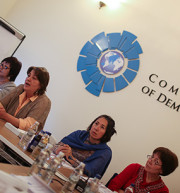
GENEVA – United Nations Special Rapporteur Maina Kiai will be in Geneva this week to participate in several events on the margins of the 28th Session of the UN Human Rights Council, including the launch of landmark joint guidelines on the right to freedom of association. The guidelines – which were developed by the Organization for Security and Co-operation in Europe’s Office for Democratic Institutions and Human Rights (OSCE-ODIHR) and the Venice Commission – are the first of their kind in the field on association rights. They were adopted and released last December, and are being officially launched on March 5. The guidelines are currently available via the OSCE-ODIHR website via this link: http://www.osce.org/odihr/132371 The guidelines offer advice and expertise on how to legislate on freedom of association-related matters in a manner consistent with international human rights standards and OSCE commitments. They also reflect evolving good state practices, and are intended to enhance awareness of the right to freedom of association in general. The Special Rapporteur and his team participated in the development of the guidelines, most notably at a consultation in Warsaw, Poland, last year that brought together experts from around the world. “International treaties merely set out broad... Continue reading →

(WARSAW, Poland) – Political will is a major obstacle in ensuring civil society’s access to resources in many OSCE countries, according to participants in a May 7 regional dialogue organized in Warsaw by the Community of Democracies and the team of UN Special Rapporteur Maina Kiai. “It’s not a question of convincing through enough human rights laws or standards,” said one participant. Sometimes “they can’t be convinced.” The dialogue was the first event in a new two-year project focused on enhancing space for civil society and strengthening the right to access financial resources. The project was launched in February, and is being funded by the Swedish Ministry of Foreign Affairs. The May 7 Warsaw event looked at international human rights norms, standards and mechanisms to promote the right to freedom of association – and possible ways to strengthen these tools. More than 20 members of civil society from throughout the OSCE region participated. The focus on political will was central to the discussions, with one participant saying that talking about human rights norms to the government in his country was like “talking to the wall.” As a result, the road to ensuring civil society’s access to resources will require creative schemes and new ways of thinking, participants said –... Continue reading →